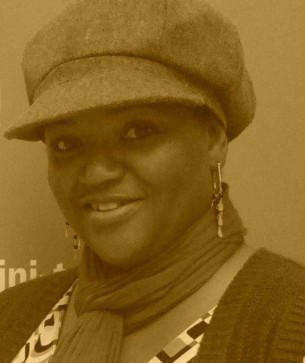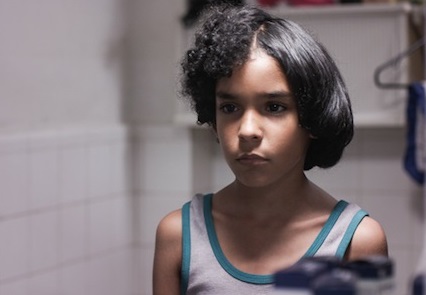FILM REVIEWS – TORONTO INTERNATIONAL FILM FESTIVAL 2013
REVIEWED BY DONNA G.
donna g. (photo credit G.Gringas)
____________________________________________________________________________________________________________
Bad Hair (Pelo Malo) A nine-year-old boy’s preening obsession with straightening his hair elicits a tidal wave of homophobic panic within his hard-working mother, in this tender but clear-eyed coming-of-age tale from Venezuelan writer-director Mariana Rondón. -Diana Sanchez, Toronto International Film Festival Programmer (Latin American, Spain Portugal)
Bad Hair (Pelo Malo) is my introduction to Mariana Rondón‘s work, and I was impressed with the subtle qualities in her writing and directing. This mother-son story needed a gentle touch and it succeeds because Rondón knows how to tell a familiar tale without using clichéd scenes and dialogue. Indoor scenes of Marta (Samantha Castillo) frame her in an apartment that although scrubbed clean, still looks gloomy, as if Marta’s desperation clouds the air. In outdoor sequences, Marta walks as if the burdens of her life are strapped to her back. Even navigating the crowded streets and buses of the Venezuelan city, she seems alone. The reality of her situation as an unemployed, single mother of a nine-year-old son and a toddler is something she cannot escape and Castillo’s face and demeanor reflect her boxed-in existence. Recently fired from a security job, she tries to meet with her boss to get reinstated on several occasions only to be rebuffed by lies, and attempts to secure work elsewhere conflict with her need for childcare.
While Marta is consumed with finding a job and taking care of her children, her son Junior (Samuel Lange) is consumed with straightening his curly hair so that in his school picture, he will look like a singer his grandmother admires. The harshness of the neighbourhood in which he lives is tempered by the way children see their world. Through Junior’s eyes we see the innocence of him wanting to be himself, to sing on the bus, to straighten his hair, but we also hear through his conversation with his best friend, a young girl who lives in his building, about the dangers that surround them. Their casual conversations reference parts of the area where “people get raped”, how to avoid drug dealers, and how to walk quickly to their designated destinations. I’m not even sure the children know what the word “rape” means, but the casual nature of their nine-year-old conversation highlights how familiar the word must be for them to use it.
With a toddler to find childcare for while she job hunts, and a lack of financial and moral support, and a flamboyant son surrounded by dangers, it’s easy to understand Marta’s burden, even if we may not agree with her assessment and treatment of Junior. As for Junior, he loves his mother, but he enjoys the fact that his grandmother encourages him to sing and straighten his hair. What he doesn’t understand is that his grandmother has her own agenda where he is concerned.
I really enjoyed what Rondón has to say about self-determination and the choices and sometimes compromises that we have to make regardless of age. What emerges on screen is a compelling mother-son relationship film that can be universally understood.
Witching & Bitching (Las Brujas de Zugarramurdi)
Fleeing through the impenetrable forests of the Basque countryside after a jewel heist, a hapless band of robbers runs afoul of a coven of witches, in this madcap supernatural spectacle from Spanish genre specialist Álex de la Iglesia (The Last Circus).–Colin Geddes, Midnight Madness and Vanguard Programmer, Toronto International Film Festival
Witching & Bitching made me laugh uproariously, and what better place to have done so than at TIFF’s Midnight Madness programme at the Ryerson University Theatre: a witching hour screening, an audience of over 1, 000 people pumped up by beach ball and inflated Spider Man tossing, and MM programmer cum genre film cult leader Colin Geddes heightening the fun furor with his introduction and banter with director, Álex de la Iglesia.
Witching & Bitching is a horror farce that humorously examines the relationship between men and women. All is not right in this world where men have become embittered about their divorces. Their conversations reveal the injustice they feel about unfair custody battles. They love their children, damn it, and they want to spend more time with them than the mothers and the courts allow. But is robbing a jewelry store with your young son in tow, the best way to win the battle?
Even painted in silver and dressed as Jesus, Hugo Silva plays it straight as José, the bumbling thief and Dad. All hell is breaking out around him, his partner in crime, a businessman in the wrong place at the wrong time, and a commiserating taxi driver, who also feels the pain of divorce.
Are women really the witches men make them out to be? Well, in Zugarramurdi there is a coven of witches that are calling on their goddess and they need a male sacrifice in order to herald her and appease her upon her arrival. Spanish screen legend, Carmen Maura, plays Graciana, the coven leader intent on trapping the men in town. The role is rich in melodrama and taken to the extreme of anything audiences might have seen Maura play in her Almodóvar films. Her make-up and wig are fantastically hideous as she plies her trade, although she trades her rags in for a more chic and matronly look for a macabre dinner party scene.
Graciana is so focused on her lust for power and control that she fails to see the budding interest her daughter, Eva (Carolina Bang) is developing for José. Eva, having been raised by a mother with a one track mind and socialized to see men as pawns, begins to question her lot in life even as she toys sadistically with José. Is he to be a pet, sacrifice, lover?
In Álex de la Iglesia’s vision, it seems the men and women are all equally flawed in the way they respond and relate to one another, making for a gutsy farcical dark comedy that doesn’t pull any punches in the way it delivers its message. If you enjoyed his work in Crimen Ferpecto then you are bound to love this movie.
Note: at the Q & A session, Álex told us that the film was shot in the historic witch town of Zugarramudi, and in the witch caves.(Cuevas de las Brujas). Many of the extras were inhabitants of the town who were thrilled to participate in the film, and worked extended hours without complaints.




